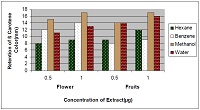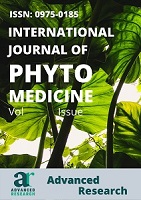In Vitro Antioxidant Activity of Flowers and Fruits of Alstonia scholaris
Keywords:
Alstonia scholaris, anti oxidant potential, DPPH, Beta CaroteneAbstract
The ethnobotanical and pharmacological evaluation of plant based chemicals have shown rapid strides in the last few decades. Plants have been a rich source of important therapeutic agents and form the basis of herbal systems of medicine, like ayurveda, resulting in the revival of ancient traditions of medicine. The present study was carried out to investigate the anti oxidant potential of the inflorescence and fruits of Alstonia scholaris using an in vitro model system like DPPH assay and Beta carotene Assay. The methanol extract of the flower showed powerful antioxidant activity by DPPH and Betacarotene assays in comparison with the standard butylated hydroxy toluene (BHT), l- ascorbic acid. For DPPH assay the IC-50 value was also calculated and was found to have a significant correlation between benzene extract of flower and methanol extract of fruits. Overall, the methanol extracts of flower showed higher anti oxidant activity than the fruit
References
Newman DJ, Cragg GM, Snader KM. Natural products
as sources of new drugs over the period 1981-2002. J
Nat Prod. 2003;66:1022-1037.
Brand WW, Cuvelier HE, Berset C. Use of free radical
method to evaluate antioxidant activity. Food Sci
Technol. 1995;82:25-30.
Manjunatha BK and Vidya SM. Indian Journal of
Pharmaceutical Sciences. 2008;70:241.
Nadkarni AK. KM Nadkarni’s Indian Materia Medica,
Vol. 1, Bombay, India. Popular Prakashan. 1976;p. 80-
Kirtikar KR, Basu BD. Indian Medicinal Plants, Vol.1,
Allahabad, India. Lalit Mohan Basu. 2002;p. 111-14.
Singh MP, Panda H. Medicinal Herbs with Their
Formulations. Delhi: Daya Publishing house; 2005;p
-90.
Channa S, Dar A, Ahmed S, Rahman A. Evaluation of
Alstonia scholaris leaves for broncho-vasodilatory
activity. Journal of Ethnopharmacology. 2005;97:469-
Jagetia GC, Baliga MS. The evaluation of nitric oxide
scavenging activity of certain Indian medicinal plants in
vitro: a preliminary study. J Med Food. 2004;7:343 –
Blois MS. Antioxidant determination by the use of a
stable free radical. Nature. 1958;181:1199-1200.
Graven EH, Dean SG, Svoboda KP, Mavi S and
Gundidza MG. Antimicrobial and antioxidative
properties of the volatile (essential) oil of Artemisia afra
Jacq. Flavour and Fragrance journal. 1992;7:121-123.
Jagetia GC, Baliga MS. The evaluation of nitric oxide
scavenging activity of certain Indian medicinal plants in
vitro: a preliminary study. J Med Food. 2004;7:343 –
Arulmozhi.S, Mazumder PM, Sathiyanarayanan L,
Ashok P. Screening of Alstonia scholaris Linn. R.Br.,
for wound healing activity. Opem. 2007;7:254-260.
Ilhami Gulcin, Haci Ahmet Alici, Mehmet Cesur.
Determination of in vitro antioxidant and radical
scavenging activities of propofol. Chem Pharm Bull.
;53:281–285.
Wong C, Li H, Cheng K, Chen F. A systematic survey
of antioxidant activity of 30 Chinese medicinal plants
using the ferric reducing antioxidant power assay. Food
Chem. 2006;97:705711.
Soares JR, Dinis TCP, Cunha AP, Almeida LM.
Antioxidant activities of some extracts of Thymus zygis.
Free Radical Research. 1997;26:469 – 478.
Thankamani V, James J, Veettil AKT and Sagadevan
LDM. Phytochemical screening and anti microbial
activity of Alstonia scholaris flowers (L) R.BR. Fam:
Apocynaceae. International Journal Of Pharmaceutical
Research And Development 2011;3(3):172-178.
Mishra J,Yousuf A,Singh RD,Aradhana. Phytochemical
investigation and in-vitro antioxidant potential of leaves
of Murraya koenigii.International Jornal of Integrative
Biology. 2009;7(3):171-174
Kyselova Y, Ivanova D,et al. Correlation between the
invitro antioxidant activity and the polyphenol content of
the aqueous extracts from Bulgarian herbs.
Phytotherapy research. 2006;20:961-965.
Silva EM,Souza JNS,et al. Antioxidant activites and
polyphenolic contents of fifteen selected plants species
from the Amazonian region. Food Chem.
;101:1012-1018.



